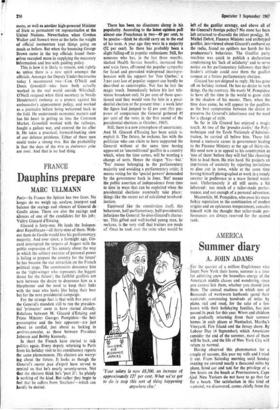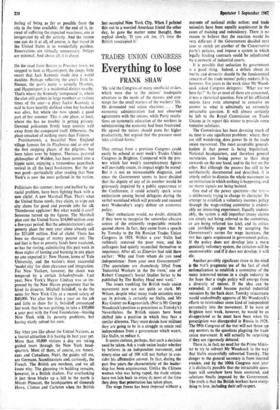Summer diary
AMERICA A. JOHN ADAMS
For the quarter of a million Englishmen who 6ount New York their home, summer is a time for admiring anew the boundless energy of the American middle classes and wondering, since you cannot lick them, whether you should join them. The annual madness in which tens of thousands of workworn husbands spend their weekends commuting hundreds of miles by plane, rail and road, for the sake of a few hours with their holidaying families, has just passed its peak for this year. Wives and children are gradually returning from their summer homes in such places at Nantucket, Martha's Vineyard, Fire Island and the Jersey shore. By Labour Day (4 September), which Americans consider the end of the summer, most of them will be back, and the life of New York City will return to normal.
Having observed this phenomenon for a couple of seasons, this year my wife and I tried it out. From Saturday morning until Sunday evening we covered nearly a thousand miles by plane, hired car and taxi for the privilege of a few hours on the beach at Provincetown, Cape .God. New Yorkers do not have to go that far fin- a beach. The satisfaction in this kind of u eekend, w we discovered, comes chiefly from the
feeling of being as far as possible from the city in the time available. At the end of it, in- stead of suffering the expected weariness, one is invigorated by all the activity. And the reason one can do it at all, of course, is that travel in the United States is so wonderfully painless. Reservations are virtually unnecessary. Delays are minimal. And above all, it is cheap.
On the road from Boston to Province tow n, we stopped to look at Hyannisport, the sleepy little resort that Jack Kennedy made into a world dateline. Perhaps reflecting the area's Irish in- fluence, the port's name is actually Hyannis, and Hyannisport is a residential district nearby. That's where the Kennedy 'compound' is, where the clan still gathers in large numbers at various times of the year—a place Jackie Kennedy is said to have heartily disliked when her husband was alive, but where she now spends a good part of her summer. This is one place, at least, where she has no trouble in getting privacy. Devoted policemen firmly keep tourists well away from the compound itself. Otherwise, the place smacked of nothing more than Frinton.
Provincetown, a beautiful New England village famous for its Playhouse and as one of the first stopping places of the pilgrims, has been taken over by hippies. Thoreau, pastoral philosopher of Walden, has been turned into a hippie saint, enjoying a tremendous paperback revival in all the local bookstores. But the air was good—particularly after reading that New York's is now the most polluted in the nation.
Politicians this summer, beset and battled by the racial problem, have been fighting back with a new cliché. A new Marshall Plan. That's what the United States needs, they claim, to wipe out city slums for good and provide jobs for all. Thunderous applause! But what would it cost? Someone turned up the figures. The Marshall plan cost the United States $14,000 million over a five-year period. But the administration's anti- poverty plans for next year alone already call for $25,600 million. End of cliché. There has been no shortage of money poured out. The sad fact is that as poverty funds have escalated, so has the rioting, culminating this past week in three nights of looting and burning in one place no one expected it : New Haven, home of Yale University, and the nation's most successful 'model city' for slum clearance and integration. For New Yorkers, however, the shock was tempered by a certain Schadenfreude. Last year, New York's Mayor Lindsay was so im- pressed by the New Haven programme that he hired its director, Mitchell Sviridoff, to do the same for New York City at a record salary of $40,000. Yet after less than a year on the job and little to show for it, Sviridoff announced last week that he was quitting, to take a $50,000 a year post with the Ford Foundation—leaving New York with its poverty problems, but having nicely solved his own.
Say what you like about the United Nations, as a tourist attraction it is having its best year yet. More than 10,000 visitors a day are taking guided tours through the New York head- quarters. Most of them, of course, are Ameri- cans and Canadians. Next, the guides tell me, are Germans, Scandinavians and, curiously, the French. The British are nowhere, and we all know why. The gleaming UN building remains, however, in a British shadow. For overlooking it just three blocks up a hilt to the north is Mount Pleasant, the headquarters of Generals Howe, Clinton and Carleton when the British last occupied New York City. When I pointed this out to a worried American friend the other day, he gave the matter some thought, then replied slowly, 'If you ask me, it's time the British reoccupied it.'































 Previous page
Previous page